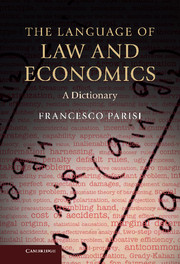B
Published online by Cambridge University Press: 04 August 2017
Summary
Background risk: certain activities or events may increase (or reduce) the probability of a given outcome. For example, exposure to a given dangerous substance may increase the risk of lung cancer. The background risk is the risk of that outcome (lung cancer) prior to the event (exposure to dangerous substance). The concept of background risk is particularly relevant in tort law. For example, if the risk materializes (the exposed individual develops lung cancer) and the background risk was sufficiently high, a causation question may arise: was cancer caused by the exposure, or would it have developed anyway due to the background risk? Similarly, when quantifying harm, should compensation be discounted by the probability that the individual would have suffered lung cancer in the absence of exposure? The legal allocation of background risk has important effects on the parties’ incentives and may create adverse selection and moral hazard problems for prospective tortfeasors and victims. See also coincidental causation.
Backlash effect: a fundamental question addressed by the recent law and norms literature considers the critical interaction between legal and social sanctions in promoting socially desirable behavior. Kahan (1998, 2000) has pointed out that, in many situations, laws that depart from the current values of society may run against “sticky norms.” This may lead to the ineffectiveness of legal intervention and, possibly, to backlash effects. Recent work in experimental and behavioral law and economics provides evidence of the backlash effects of legal intervention (Stuntz, 2000; Depoorter, Parisi, and Vanneste, 2005; Parisi and von Wangenheim, 2006; Depoorter, Van Hiel, and Vanneste, 2011). Legal sanctions and levels of enforcement may be perceived as being excessively strict and society may react to such unjust laws, undermining the intended effect of legal intervention, such as after the recent wave of copyright enforcement, which led to a backlash effect, with a resulting increase of copyright infringements (Depoorter, Van Hiel, and Vanneste, 2011). See also inexpressive law, sticky norms, countervailing norms, normative overdeterrence, and hard shoves versus gentle nudges.
- Type
- Chapter
- Information
- The Language of Law and EconomicsA Dictionary, pp. 19 - 34Publisher: Cambridge University PressPrint publication year: 2013

